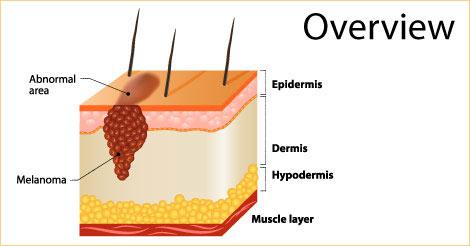All You Need to Know About the Basics of Skin Cancer
The most popular and blissful proverb has to be Ignorance is bliss.

It has sheltered us from many things that could have been stressful at some point. This approach does not apply to our health and life at large.
If you tend to notice a small, irregular spot on your body skin or a rash that refuses to go away, do not ignore it! Consult a doctor.
Skin is the largest organ of our body and probably the most exposed too! The crucial function of the skin is to protect our body, maintain body temperature, and help produce Vitamin D.
Damage from the sun can be the common cause of skin cancer. Millions of people are at risk of developing skin cancer.
Regular screening helps detect any abnormalities, and hence a health check-up is recommended every six months.
What is Skin cancer?
The cells of the skin begin to grow abnormally due to prolonged exposure to the sun. It usually develops on areas exposed to the sun, but it may appear on the non-exposed areas, too, like fingers and genital areas. The types of skin cancers are determined based on where cancer begins. Skin cancer, if detected early, can be easily cured. It is not contagious.
Types of Skin cancer:
The Basal Cell Carcinoma:
This cancer begins in the basal cells of the skin. It is the most common form of skin cancer. It is seen as a small, skin-coloured, smooth, bump-like structure on the skin.
The skin colour may change too. If not treated in time, it can grow deep down and affect the nerves and bones.
The Squamous Cell Carcinoma:
It is the second most common type of cancer. It activates in the squamous cells, which are in the skin. It may look like a firm, rough, scaly, red coloured bump on the skin.
Melanoma skin cancer:
It is a more serious type of skin cancer, as it can spread all over.
Melanoma cancer develops in the melanocytes, the pigment-producing cells in our body. We get our skin colour due to these melanocytes.
It may look like a brownish spot, a painful lesion, or a mole that can bleed and itch.
The other types include Merkel cell carcinoma, Cutaneous T cell lymphoma, and Sebaceous Carcinoma.
The good news is that skin cancer can be cured easily if detected early.
Causes and Risk factors:
Everyone is at risk of skin cancer as it is caused mainly due to sun damage to the skin. There is no known definitive cause of getting skin cancer, but the below-listed causes; could be a trigger and could induce cancer.
- Overexposure to the sun
- Tanning beds
- Genetic factors
- Environmental factors
- Solariums
- Weakened immune system
- Exposure to radiation
- Precancerous skin lesions
- Family history
Anyone can be at risk. Skin cancer can develop regardless of age, nationality, race, or skin colour.
Some Symptoms:
Not all bumps or lesions are cancerous, and usually, the cancerous ones can be treated easily. It is hence always necessary to get an evaluation of any abnormalities seen on the skin. A bump or a lesion that is new on your body
- Jagged or asymmetric moles
- Change of colour in a patch of skin
- Any skin lesion which changes colour, shape, or size
- Itchy skin, which tends to bleed
- Any abnormal growth of lymph node
The American Academy of Dermatology recommends the ABCDE for melanoma.
Always check for Asymmetry, Border irregularity of any patch formed on the skin. Keep a check, on the Colour and Diameter and check to see if the patch is Evolving.
How to know if you have skin cancer?
A thorough physical examination of the body can help notice any abnormal changes, like scars, moles, or lesions. It can then be inspected and evaluated by the dermatologist or doctor to verify the severity. Biopsy and imaging can help in diagnosing skin cancer.
- A biopsy is a process performed when the doctors find suspicious growth. The biopsy helps in making a conclusive diagnosis. Depending on the case and type of growth; the doctor performs an incisional biopsy, excisional biopsy, or a shave biopsy.
- Imaging is the scan or radiologic study of an in-grown lump or lymph node. It helps the doctor understand how the growth has progressed and assess its invasion into other body structures.
- Sometimes in severe cases, blood work is also required.
A stitch in time saves nine!
A physical examination is necessary to rule out skin cancer or any cancer. A complete body check-up is a perfect tool to assess the condition of our body and catch the diseases, any in, their nascent stage. That helps the doctors to treat the disease better.
The treatments:
The treatment plans vary for each patient. Depending on the severity and type of skin cancer, the doctors recommend a treatment.
- Surgery: this can be the first-line treatment, where the methods of resection are involved.
- Radiation
- Chemotherapy
The unique hurdles each one faces is a journey on its own. Regular health checkup of the skin and annual examinations by doctors can help keep cancer from progressing.
Prevention:
With cancer, anyone can be at a risk! You can rely on the Indus Health Plus preventive health check-up to detect anomalies. That helps take the essential steps to curb the disease before it gets serious.
Taking a preventive health check-up every six months is your sure-shot way to address any disease and be on the path to wellness.
A few tips to bear in mind
- Avoid direct sunlight in the afternoon
- Always wear sunscreen and reapply after a few hours
- Wear sun-protective clothing and keep the skin covered
- Avoid tanning procedures
- Keep a check for any unusual bump, spot, or lesions on the body
It is best not to wait till things get worse. Sign up for your Indus Health Plus preventive health check-up today! After all, the age-old saying ‘Prevention is better than cure is true even today.
Fill up our form today to assess your health and get a call from our experts!

.png)
.png)









